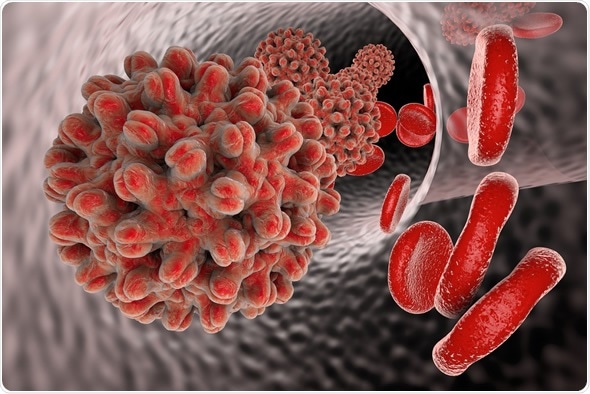The Hepatitis B virus (HBV) is a cause of liver disease. In some cases, HBV can be a short-lived, acute infection, but in others it can become a life-long, chronic condition and lead to cirrhosis of the liver, cancer of the liver, liver failure and death.

Hepatitis B virus in blood vessel with red blood cells. A model of virus is built using data of viral macromolecular structure furnished by Protein Data Bank (PDB 4G93). Image Copyright: Kateryna Kon / Shutterstock
Transmission
HBV is transmitted through activities that lead to contact with the blood, semen or other bodily fluid of an infected person. Some modes of transmission include:
- Having sex with a partner who is infected
- Being born to an infected mother
- Sharing infected drug-using equipment such as needles and syringes
Vaccination
The most effective way to protect against HBV infection is to get vaccinated. People who are at risk of HBV infection and should consider vaccination include the following:
- Users of injected drugs or people with a partner who uses injected drugs
- Men who have sex with men
- People who frequently change sexual partners
- People with kidney disease who receive dialysis
- People with chronic liver disease
- Close family member or partners of someone with HBV
- Babies born to infected mothers
- People who receive blood transfusions
- Sex workers
- People travelling to countries where there is a high risk of HBV infection
- People working in occupations where there is a risk of contact with infected blood such as doctors, prison staff and nurses
- People who have HIV
For full protection against HBV, vaccination involves three to four injections of the HBV vaccine, which are administered over the course of four to six months. Follow-up blood tests are available for people to check they have responded to the vaccine and five-year booster injections are advised for people who are thought to be at ongoing risk.
Pregnancy and Babies
HBV tests are given to pregnant women as part of routine antenatal care. There is no live virus in the vaccine and no apparent risk of damaging side effects to the fetus while it is developing in the womb.
Babies born to infected mothers must be administered a dose of HBV vaccine within 24 hours of being born, with further doses administered at one, two and 12 months of age. Mothers who have been identified as particularly infectious, may be given an injection of antibodies called hepatitis B immune globulin (HBIG) in addition to the vaccine, which provides rapid protection.
Emergency HBV Vaccination
If a person is exposed to the HBV virus and has not previously been vaccinated, they should seek immediate medical advice, as they may benefit from the HBV vaccine. In some cases, an HBIG injection may also be given.
Safety
The HBV vaccine is a very safe vaccine that does not usually cause any problems other than redness and soreness at the injection site. Other side effects are rare, but, as with any medicine, there is a risk of a serious allergic reaction, which is thought to occur in about one in 1.1 million doses.
Further Reading
Last Updated: Feb 26, 2019